Get posts by email
The Three R's of Homeschool Organization
October 7, 2013
Time to scratch the organization itch.
There are a few levels of bliss for us organizing junkies: making plans and lists, organizing space and the "stuff", and taking photos, writing and sharing about being organized (smile).
Today I'm sharing the three R's of our current homeschool organization.
(click to go straight to section)
Let's just dive in.
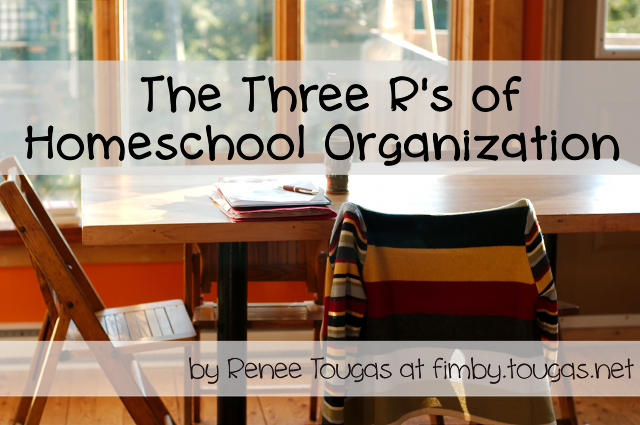
1. Resources
I've already listed the resources we're using for this fall's curriculum in this post. Now I want to show how I organize those resources, and all the other "school supplies" in our actual living space.
This section could also be called space organization but I wanted to go with the 3 R's theme to be all clever like that.
We have lived in this current house since last July and this month I moved our craft supply shelf into our dining room to make project supplies more accessible.
The kids do a lot of project based learning and one idea for supporting that type of learning, according to Lori Pickert's book Project-Based Homeschooling, is by setting up individual project space for each learner (at least that's how I read it).
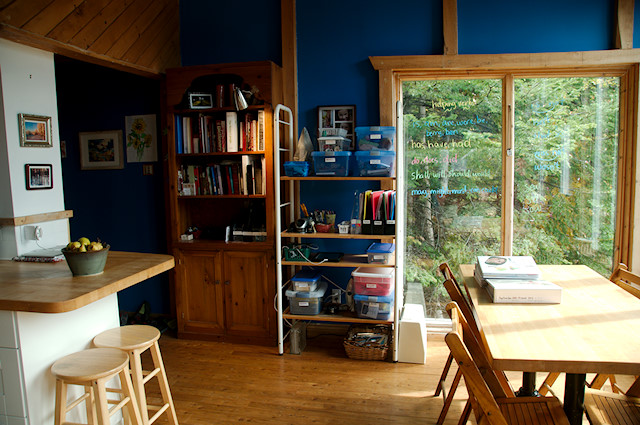
We haven't been able to establish separate desk or studio space for each of our children.
A combination of small houses, moving frequently in recent years, and our kids' propensity to do everything in the dining/living area of the house have made designated project space unrealistic in our home dynamic.
We've done really well without designated project/study space for these nearly 15 years of having kids so I'm ok with that. But I had noticed that recently, since we moved 2 years ago actually, we weren't doing a very good job of having space for ongoing projects.
Bins are my friend.
They are not the beautiful wicker baskets of a home decor magazine but they work really well - they move and store well, fit any living space we've lived in, are affordable, and fit the type of projects my kids tend to do (small, but perhaps we've encouraged that in our small space living philosophy).
A few bin updates this fall:
All the current project bins are now housed in our main living area instead of the side room which is the all purpose "catch-all" area of our life. I wanted to encourage more regular project work and so I've moved the bins within easy reach of where most of our living happens.
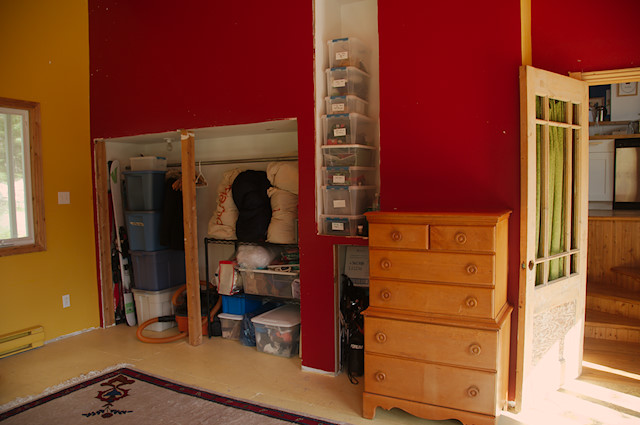
our studio craft storage
I also have noticed a waning of hand projects in our home, that is a natural part of growing up, but I also figured I could encourage more drawing, sewing, coloring, painting etc. by just having all that stuff more accessible.
The craft supplies that are most often used are now kept next to the dining room but the rest of the supplies - beads, glue, clay, fabric, various papers, wood supplies, extra office supplies, etc. are kept in the "studio". In the dresser or on a shelf in the gear closet.
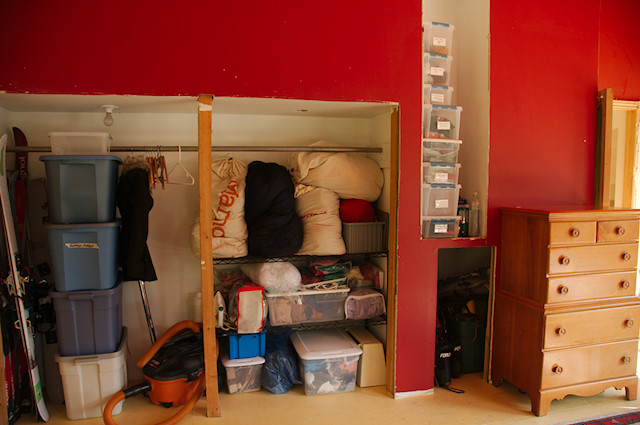
the gear closet
The studio is our catch-all side room which rotates through all the jobs we give it - guest room, gear storage, summer sleeping room, computer desk area.
This room currently houses a futon and computer work station which will be moving to our walkout basement this fall, to the warmth of the woodstove and to make room for a staging area for our AT hike preparations. It will be "the" project room.
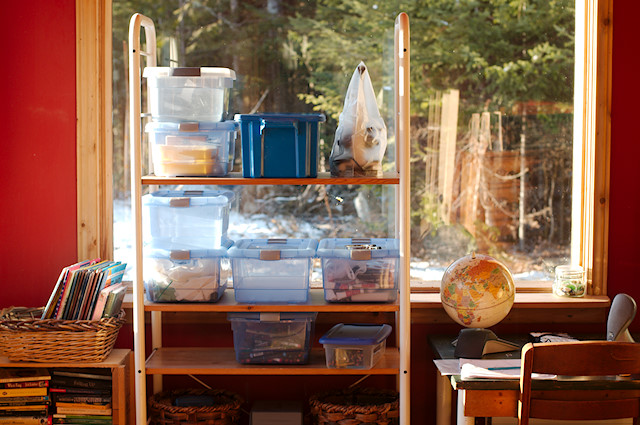
bins used to be stored in the studio
This shelf, which is now in the dining room, also holds the kids' "school sections". You know how you start using a word or phrase, and it sticks; school sections is one such phrase.
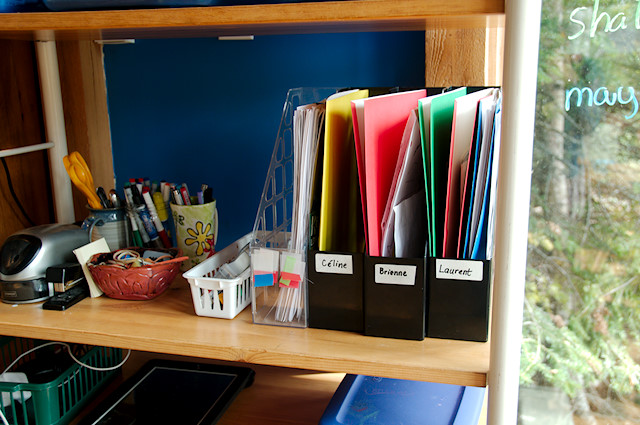
School sections is where all current school paper work is stored. Right now the kids have some writing projects in their sections, the Canadian map we're slowly labeling, and personal drawing and/or other paper "stuff".
When the kids were younger and used more hardcopy workbooks and such for handwriting and math we stored these in their school sections.

previous school section storage
The school sections are temporary storage spaces. Once something is complete it is moved to the portfolio binder. Or, as is more often the case, left in the school section for months and then we do a big sort, file, and purge - see photo below.
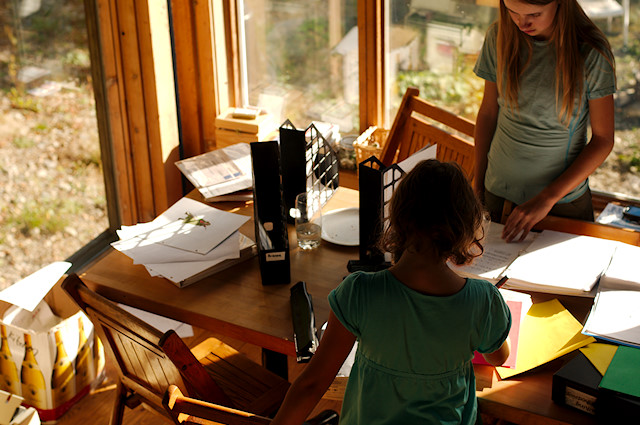
A new organizing feature in our stuff storage is using magazine dividers (I believe that is what these plastic holders are called) to house electronic devices. Everyone has one, except me since I keep my Kindle in my bookshelf section. Ipads, kindles, and headphones are kept in these places. Or rather, placed here by me as I pick them up off the kitchen counter, couch and table.
Digital resource organization
A lot of our homeschooling resources these days are digital.
My digital organization is bit more haphazard than my physical space organization, because of a neat little feature in a computer called search.
I try to keep relevant information, resources, and files in their appropriate school year. And general resources, not attached to a school year, are filed under subject heading.
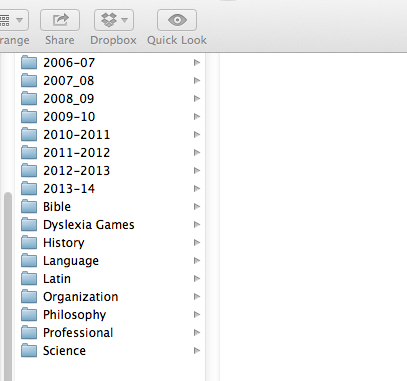
I started digital record keeping and filing for school eight years ago, in Celine's 2nd grade year.
I store my homeschool related ebooks (the kind you find in these ebook bundles) in a different folder on my computer, with my books-in-general.
And this year because I'm using a number of digital teaching resources, including our physics resource and grammer program, I keep those handy right on my desktop. When I'm done with them I'll move them into the general school files you see in the above photo.
This part of my homeschool system is not highly organized. It's more like a hanging file folder in the cabinet that I put everything into instead of having multiple file folders color coded and labeled. But it works for me and for that reason it doesn't deserve any significant re-organizing or refining effort.
Takeaway: If it works keep using it, don't feel you need to organize something that is already working as is.
Web Idea storage:
I currently use Pinterest, browser bookmarks, Evernote, and DEVONThink Pro for bookmarking study topics, cool sites for the kids to check out, homeschool support sites in general, etc. I will discuss DEVONThink Pro a bit more in record keeping.
Books
Of course there are books to be stored and accessed on a daily basis. We have lovely little piles (I do love book piles) on our wide window ledges, on the landing of the stairs and next to beds. These are the "current reads" and the books I leave out to encourage reading in support of our other studies.
Most of our library of hardcopy books though are stored in apple crate bookshelves which move around the house according to organizational need and whim.
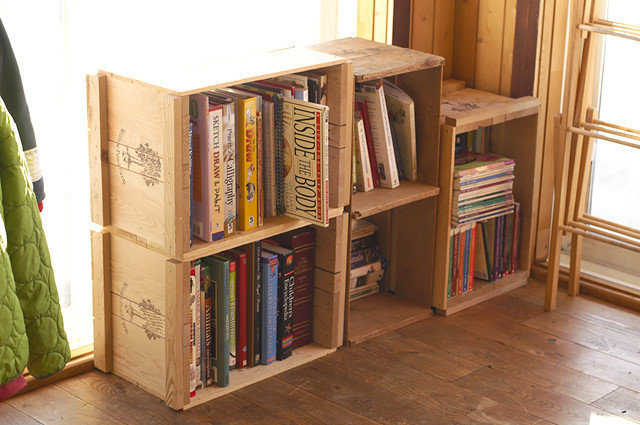
this is not the extent of our hardcopy library
The crates are currently in our basement. Our basement is a small living space with our wood stove. It's not a dark dungeon or disorderly space, which seems an inappropriate place for a family library.
An increasing number of books we own are digital. In fact, we own more books now that we can buy digital copies. These are stored on individual devices and since most of them are Kindle downloads are also kept in our Amazon library.
2. Routine
I love making a new schedule. And then I try to be all zen and do deep breathing exercises as it goes through new iterations each week.
Life is so fluid and dynamic and often in flux so our routine is the tool I use to make sure we're making progress on the goals I've laid out in our curriculum.
I use our weekly routine in two ways:
- It's a starting point. Our family life goals drive our routine and take into account, as much as possible, everyone's needs and interests. To make our goals a reality they need to have time on our schedule. So we plan the time in our weekly routine. But life doesn't always go according to plan...
- So, our routine is also a coming-back-to point. When we get off our routine, which inevitably happens, we either tweak the routine to adjust for the change (e.g., the older kids just started going to weekly church youth group) or we pick up wherever we left off. So what if Monday, Tuesday and Wednesday were a bit haywire, Thursday is a new day, start there.
The main components of our homeschool routine are, in no particular order:
- household work and chores
- exercise and outdoors
- meal preparations
- self-directed learning
- parent-directed learning
- inspiration evenings
Self-directed learning and parent-directed learning employ a variety of methods - ranging from lessons to media to making. Inspiration evenings mostly employ reading and media for the purpose of sharing stories (both historical and fictional) and inspiring ideas. Inspiration evenings are largely parent directed but cuddly and relaxing in nature.
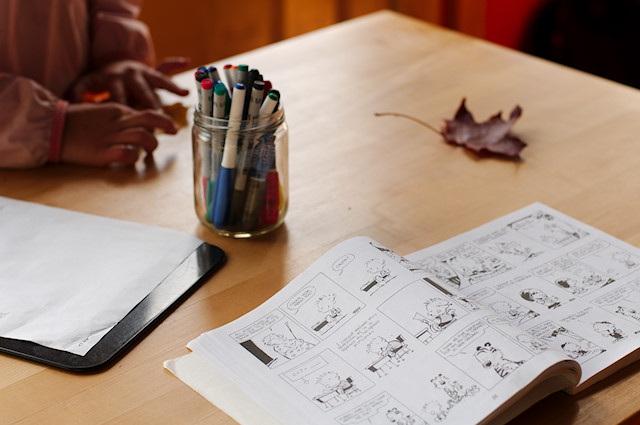
Parent-directed learning is what we call "school".
I finally feel comfortable calling our routine school times what they are. I used to explain it as our formal learning or structured learning but that was never quite right since "formal learning" as a term doesn't make sense.
What is formal learning, exactly? Structured learning makes a bit more sense, it sounds like a structured time for learning but then again, our whole day is structured for learning, just different types of learning.
Here's the deal: Our kids are learning all the time. They are self-directing their own projects and play. They are making stuff and reading things. They are communicating their ideas to other people with art, writing, and design.
They are exploring and exercising outdoors. They are experimenting with materials and devising systems and ideas for understanding the world. They truly are learning all the time.
But in order to teach a few important foundational skills, to share things with my children I am passionate about, to communicate ideas to inspire their personal study, and to address specific needs they have (like Laurent's dyslexia) - we have parent-directed learning times.
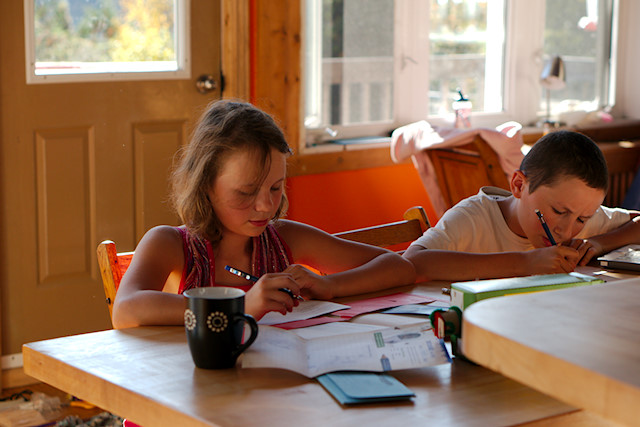
It's always been this way. I'm not sure why I didn't call it this before, but there you have it.
Parent-directed learning is when I teach lessons, this fall it's physics, grammar and Canadian geography. It's when I pull out of my bag of tricks any ideas I've been wanting to share. Sometimes we watch TED talks or inspiring YouTube (though we often do that in the evenings also.)
This is the time I read-aloud to the kids, our current read-alouds are Canadian history stories. We may play games during this time or jump on the trampoline together. This is when I teach writing through the children's own interests and projects. (Aside from the steady "how do I spell, how would I say..." etc, that goes on in our home during the rest of the day.)
Our parent-directed learning time, aka school, is also when I make myself available to support the kids self-directed learning. It's a time in our week that they can turn to me for more dedicated assistance.
Math is an independent study in our homeschool and is done mostly without my intervention or leading, so is not part of my usual hands-on time, except when they need help with a concept. It was very hands-on when my kids were little though.
Our school time is never the exact same routine each day but there are common elements the kids expect.
This is my take on what the DeMille's call structuring time, not content in their book Leadership Education.
You establish learning routines and regular habits, but you aren't terribly hung up on what happens during that time. You come to that time with ideas to share and projects you may want to work on but you're not ruled by a checklist you must complete.
Your ideas are a springboard for open ended and student engaged learning, it's not about completion or moving through the curriculum. It's about being engaged in meaningful learning - inspiring your kids and staying inspired yourself. I can't emphasize that last point enough - the importance of the parents being as inspired as the kids.
If I had to do the same routine with my kids every day and "push" them through a curriculum to "finish on time" (What the heck does that mean? In time for what?) I would go crazy.
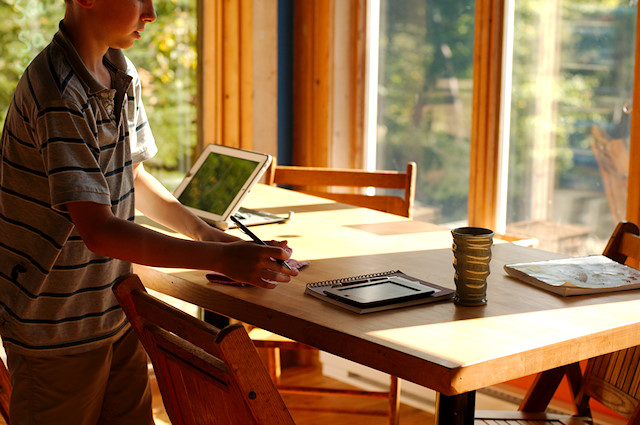
I couldn't homeschool like that. I think this is one reason why people say, "You homeschool? I could never do that?" Yeah, me neither!
This parent-directed time used to happen mostly in the mornings. This past spring we switched to the afternoons to accomodate later sleep schedules for growing kids and to make time everyday for all of us to be exercising outdoors in the morning. The kids currently also do their math in the morning.
Celine's daily routine tracks with the family schedule but her parent-directed learning time has been replaced with self-directed studies. And she is engaged in rigorous study for long stretches at a time, which is not the case for our younger children.
3. Record Keeping
My record keeping has stayed pretty much the same through the nine full years I've been "officially" homeschooling. We use binder portfolios to keep school records.
I did a video at Simple Homeschool showing how I set up those binders.
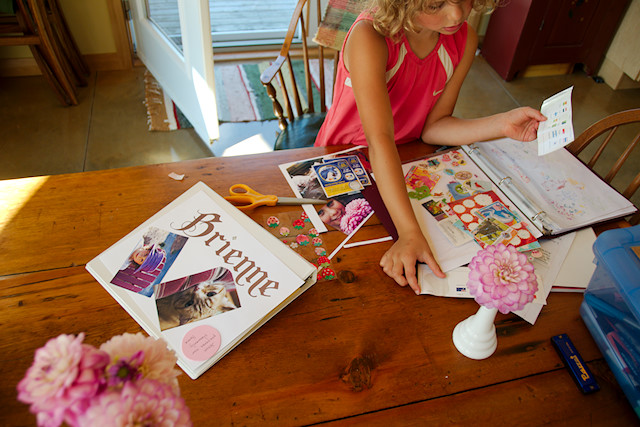
Brienne making her homeschool portfolio binder two years ago
I'll recap it here for you.
Family binder:
This is where I keep family learning related documentation. Pamphlets from museums and field trips, group writing projects and family poetry, collective math activities, etc. I divide it all by subject (according to our curriculum) and file it through the year.
The family binder is also where I file ideas, booklists, planning documents, and miscellanea - you know those little scraps of paper and sticky notes you write with book titles, field trip ideas, etc.
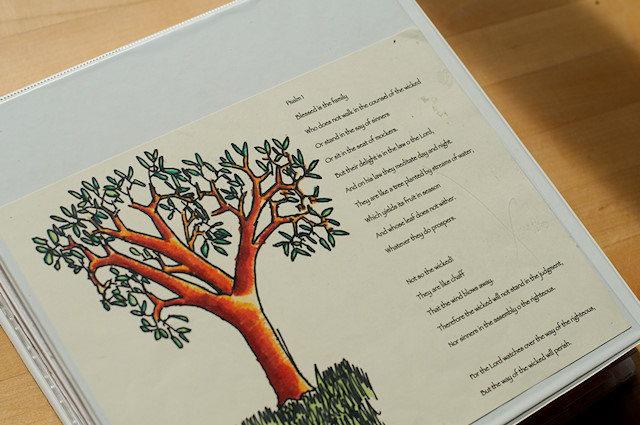
Personal binders:
Each kid has their own binder. We divide it into sections based on our curriculum, usually only four of five sections. We lump together certain subjects because twelve dividers or so is overkill. Our sections are usually Language, Math/Science, World Study, Art, Other.
Samples of their work through the year are filed in these sections. A lot of what goes into these binders is the self-directed and interest-led stuff.
When my kids were little and did hardcopy math I would file a few pages of their math workbooks in here also. We file all non-journal writing in here. Any writing that is for someone else, e.g., a letter being sent, we make copies for our records.
All kinds of work goes into the binders. Laurent's binder always features lots of art and Brienne's has more writing.
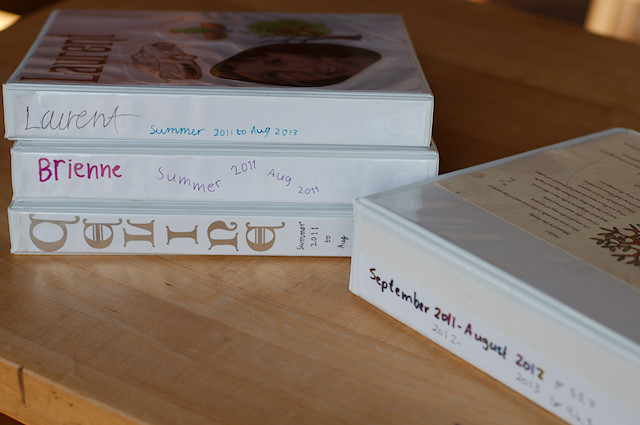
My notes:
I also make notes of the lessons we've done, other parent-directed activities, and any self-directed work that doesn't produce a document (e.g., documentaries the kids have watched). My notes are kept in the family binder until the end of the year when they are filed with each student's individual binder. (Unless they are notes pertaining to the whole family.)
I make these notes on a single sheet of paper for a set period of time. Depending on how much is going on I may do a page per month or a page per season. When the kids were younger it was often a page per season. I'm currently doing a page per month.
At the beginning of a school year I create a record keeping sheet with headings taken directly from our curriculum. To see our curriculum from last school year, see this post. See this post for the updates/changes to this curriculum for this current school year.
This is what a page looks like:
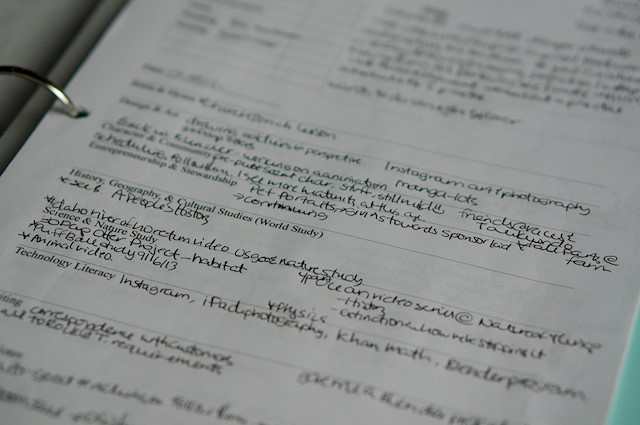
This sheet also has lots of space for random notes for me and this is where I record the kids' interests and the follow up I need to do about that.
New this year, I added a "projects" header to the page to specifically keep track of projects, trying to incorporate some of the project-based learning methods of observation and journaling into my own systems that have proven to work for me.
I am using DEVONthink Pro for Celine's high school record keeping. DEVONthink Pro is personal database software. This is not a homeschool product. It's a tool for people who need to keep track of data. It's like Evernote in someways, but more robust and not cloud-based.
I'm using it for the simple reason that it is a program Damien uses and recommended we're trying to establish a record keeping protocol that all three of us understand, use, and have access to.
Trying something new that didn't work.
Last year I tried something different. Which didn't work so well. Because so much of our kids' learning is interdisciplinary I wanted to create a spreadsheet record keeping system that would show this.
I set up a spreadsheet with specific subjects/curriculum topics across the top of the sheet and space to write learning activities down the side, creating a grid.
When the kids did an activity worth recording I would write down the activity "watched ocean documentary" then I'd x all the subjects that were touched by that one activity.
I kept this spreadsheet on my computer and attempted to do it digitally so I could make changes to the structure as I went.
That record keeping didn't last too long. And then honestly, I just didn't keep very good records last year at all. I was fooling around with different methods. In the New Year I tried journaling instead. Again, not so effective for me.
This year I went back to what works for me.
I do all my planning and year-end or new year assessments (when I do them, which is not every year) in a computer text document. I store these digitally but also print them to include in our binders.
Then I hand write and record learning on a one page record keeping sheet. A page per season or month, whatever fits the bill for where we're at.
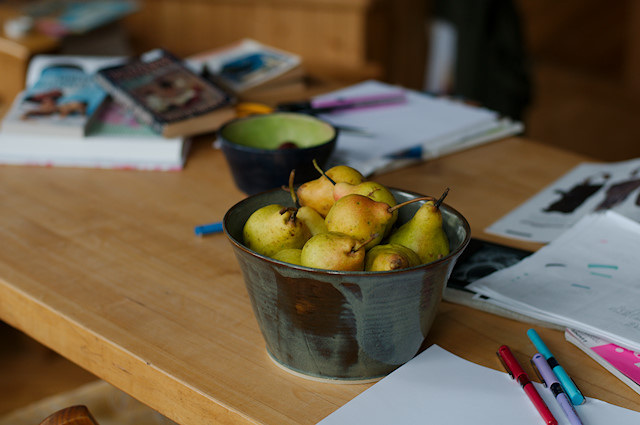
Interviews
This year I'm trying something new for my weekly, or every other week, note taking time (the time when I fill in the record keeping sheet).
I've started interviewing my kids.
This came about because Celine's record keeping is almost entirely interview based. Because her learning is so outside my domain I must meet with her regularly to check in and ask what she's up to so I can record it. (I don't have pre-set curriculum subjects for her studies the way I do for the younger two, but I'll tell you all about that in my next high school post.)
When the younger two heard these interviews going on they asked for their own, "ask me what I'm learning mom!" They didn't realize I have been keeping notes for years based on observation.
So, now I interview the younger two kids each week or every other week to fill in my record keeping sheet. They love telling me what they've studied (even though I'm observing it myself) and I love how it gives them ownership of the recording process and provides good practice giving brief summaries of their studies.
I wish I had thought of this sooner!
In addition to my interviews I rely on little notes I keep in e-mails, the backs of envelopes, ripped pieces of paper, post-it notes, and my memory from the past week or so to fill in the record keeping sheet.
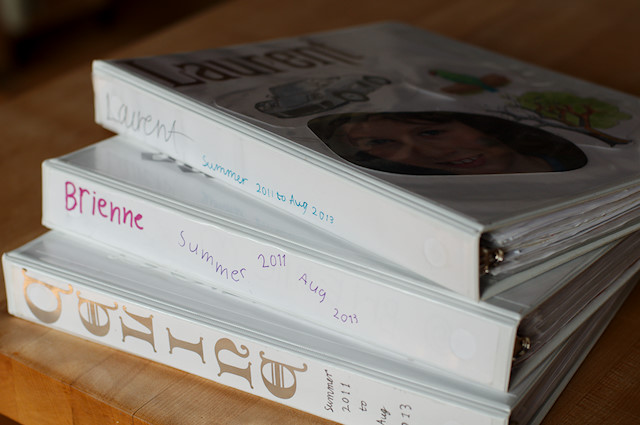
Lesson planning vs. Record keeping
Keeping track of what's going on doesn't take that much time each week. Maybe half an hour. And then another half an hour for my high school daughter.
I don't lesson plan. Instead I record the learning that is happening.
This learning might be child-directed, parent-directed, community-directed, whatever. I use my "homeschool organization" time to record what's actually going on in our home.
If lesson planning is needed I use the lessons provided by the resources we use. For example, I don't have to lesson plan our grammar studies I just follow the lessons laid out in the program. And I keep it interesting and inspiring by going completely at our own pace through the material and making the lessons very relevant and tailored to my kids, but I just do that on the fly, in the moment.
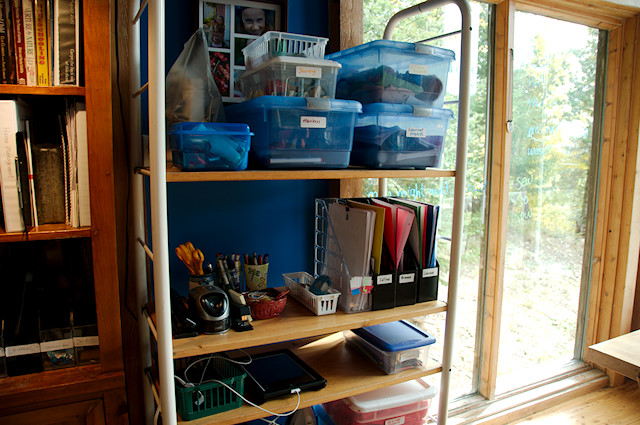
Homeschool record keeping software
In the past few years I've noticed homeschool record keeping products on the market. I haven't tried any of these for the simple reason I like to do my own thing.
I like to be able to tweak and adjust things exactly to our needs. Making a text document is not hard. Creating a page with subject headers and space to fill in notes isn't hard either.
I may use software to help me create a high school transcript for Celine someday but I'm not there yet. Most products I've seen are too narrow in their scope and too "schoolish" in their perspective. I have to fit into a mold to use the product and I don't like that. So I just do my own thing.
If you have an experience contrary to this assessment I'd love to hear about it.
Recommended resource
Alicia Kazsuk, homeschool mom of four and blogger at The Vintage Creative has written an excellent book on homeschool organization. Specifically how to plan for your school year and organize your days from these plans, while maintaining flexibility.
The book is called Plan To Be Flexible.
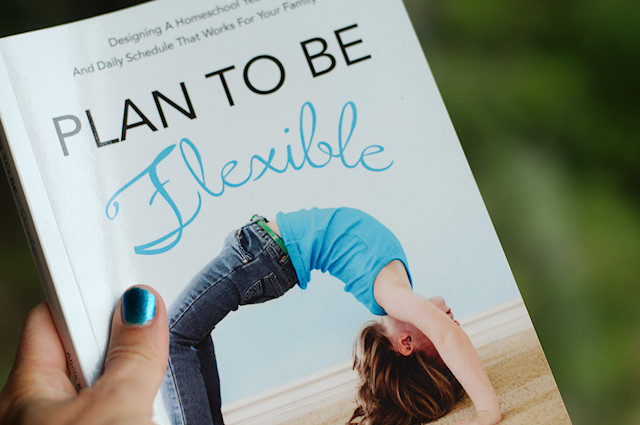
She starts the book with a story common to many homeschoolers - tight control and joy-sucking stress about getting through the curriculum, and the inevitable burnout that follows.
I can't relate to this perspective. I started my homeschool career way more relaxed than my personality type would suggest possible. If I was uptight about anything it was about protecting my children's childhood and natural love of learning.
But Alicia's story takes a turn for the better (smile) and what she learns is how to make plans and still be flexible. Two skills homeschoolers must have.
Alicia is an organizing junkie like myself. She has written a book that combines her passion for devising systems that work and her passion for homeschooling, with the aim to help you "design a homeschool year and daily schedule that works for your family".
I can appreciate this perspective immensely. I do this naturally, it's one of my strengths. If planning and scheduling isn't one of your strengths you'd probably benefit from Alicia's wisdom and experience.
The book is more external-motivation orientated and parent-driven in curriculum development and execution than I am comfortable with personally. And there are religious overtones that may not jive with all non-religious readers. But the organizing and planning principles are the very ones I use myself.
In this book, Alicia shows you how to get from A to B to C: planning your curriculum to developing a schedule to being flexible with that schedule. Yours truly is also quoted in this book, specifically a section from this blog post.
In conclusion
Sometimes I'll stumble into a theme for a given school year. It's not something I think about much, and I certainly don't plan it.
Two years ago I interviewed my kids the beginning of the school year and I vowed that year to really listen to them and tune into what they were communicating to me, in words and behaviors. (I only remember this because I wrote it down.)
Last year I don't remember grabbing a theme for the school year.
This year I can't say we have a theme per se, but we have many life maxims that we aim to live each day. This is one of them.
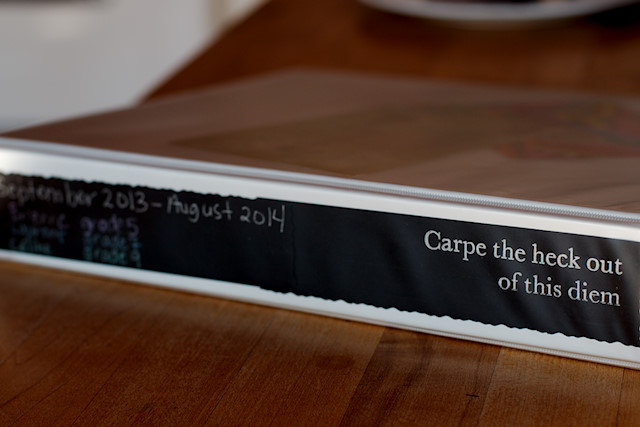
I'll leave you on that note. It juxtaposes rather nicely with a post all about getting organized, don't you think?
Filed Under
Resource Library
-

Alaina on Oct. 7, 2013, 5:52 p.m.
I'm curious- what are the reasons behind keeping records? Maybe I missed it when I was reading through your post. I can't quite get my mind around why. I don't even want to keep all the hard copy workbooks, although there aren't many right now, it would add up over the years for all the kids. I am just starting out but it looks awfully tempting just to recycle it all unless it is useable for the next child. Space constraints is one thing, but the other thing is that am I ever going to look at it again? Maybe I read it wrong and you just keep some samples of each thing? At this point I create flexible "day plans"- sort of a guide for what I would like to do that day- but then when the day is over I just recylce the paper and that is that (copying down anything we didn't do for another day). I have my big goals for the year plans etc. and I would keep those, with our reading lists etc, but other than that can you share more reasons for keeping stuff?
-

renee on Oct. 7, 2013, 7:38 p.m.
Alaina, so there are two separate issues here you're talking about - general record keeping and keeping workbooks, as I read it.
As to why I keep records in general, firstly, I do so because I like to. I am a record keeper by nature and an organizer by nature, the person who keeps receipts and warranties, balances the checkbook, all that. I'm the person, who if you ask "where's that receipt from the sleeping bag we purchased five years ago?" I'll have it in your hand in 2 minutes. (Now I'm going all digital in that though). I am also our family story teller, the one who wants to write down and remember the details. I wrote about this record keeping nature of mine in this post.
So there's that.
Secondly, I keep records because I feel it's a necessary homeschooling practice in a world where authorities can investigate. If you live in a place where no one is checking up on your homeschool or has no authority to possibly do so, consider yourself lucky. For many of us though, it's a wise practice to keep records of our children's learning, samples of their work, notes about their progress etc. So that we can use these to demonstrate we are not neglectful in homeschooling our kids. This is a real concern for some of us and I don't take this lightly.
Thirdly, I think it's a good practice to develop a record keeping system of some sort, if you plan to homeschool through high school. Records will have to be kept at some point, in some measure, to show proof of work for college admissions, etc. The only records necessary are those for high school level work but developing a system earlier will help you make that transition easier.
That's why I keep records. But maybe you were confused about what I meant by these records because workbooks are not part of my record keeping. Once we've used a consumable program we get rid of it. I will make copies of early and later work to show progress to file in the kid's binders, but that's 2 pages. Other stuff we sell. I don't keep old workbooks, only samples of the kids work from those materials, but more importantly I like to keep the kid's favorite artwork and personal things. The poetry we write, the newspaper they published, etc. This is what I mean by record-keeping.
Also, my kids love looking back through their old learning binders. When they graduate from homeschool and the binders are no longer needed for me to prove anything to anyone I'll probably cull out a few of my favorite memorabilia and give the rest to the kids and they can choose what to keep and get rid of. But currently, they take up only one shelf in the bookcase, it's really not that big of a space deal.
I don't keep my daily to-do list and plans like that. I used to (smile) but found I never needed to look back at those so I stopped and got rid of all my saved "daily dockets".
I've answered this question one other time on another organizing post.
-

Alaina on Oct. 7, 2013, 7:50 p.m.
Thank you! This makes so much more sense now. I don't use a whole lot of workbooks anyways, and don't plan on doing a lot that way, but I got thinking after reading your post. Thank you for the clarification!
-

renee on Oct. 7, 2013, 8:30 p.m.
Oh good. It's sometimes so hard to explain in words. If you came to visit I could easily show you!
Also, I haven't forgotten about the kids and hiking book review you asked about. I will respond to that soon.
-
-

Sara on Oct. 8, 2013, 1:48 a.m.
Exactly the question I had! Thanks for this post and this response.
-
-
-

Alaina on Oct. 7, 2013, 5:56 p.m.
Oh and one other thing- I came across this resource the other day and thought you might be interested- it has a used curriculum/book store and its Canadian. http://homeschoolcanada.ca/ on that site see "homeschool store".
-

renee on Oct. 7, 2013, 8:51 p.m.
I found this site recently also. I need to sell my old TT3 curriculum and I'm going to try the used curriculum store to sell that.
-
-

Francesca on Oct. 8, 2013, 7:55 a.m.
i like your 2014 life maxim! :)
one menial question about your digital books, how does your amazon library work? one family account and multiple kindles?
-

renee on Oct. 8, 2013, 11:28 a.m.
Exactly. All of our devices are attached to our amazon account - iPads, kindles etc. The amazon library stores all our books and then we just "send" them to devices we need to.
-
-

JenP on Oct. 8, 2013, 6:13 p.m.
I'd love to hear more about your interviews! Do you just write down their answers or do you record it? What kinds of questions do you ask? Do you just come up with questions based on what you see them doing? Sounds like a great way to record what's going on.
-

renee on Oct. 8, 2013, 6:54 p.m.
I will be talking about Celine's high school interviews in a future post. Her questions are designed to dig a bit deeper than what I aim to do with the younger two. I use my record keeping sheet, which has our curriculum headings (world study, science & nature study, technology literacy, writin) etc. as a springboard for asking B &L questions. What have you studied this week in this area, that kind of thing.
With Celine my questions are these:
What have you been watching? What have you been making? What have you been reading? What are you writing? etc. Since she does so much of this on her own, in our presence yes, but still I don't know everything she's up to. We're starting with simple "what" questions and eventually I think we'll move to "how has this learning impacted you? Have your views about... changed, been strengthened," etc. Doing this orally is a foundation piece to writing about what you're learning, how it's changed you, if you agree or disagree, etc. And being able to write a compelling essay and a research paper are two of my graduation goals for Celine.
This interview time of gleaning what she's been doing is separate from our project management meetings with the three of us (Damien, Celine and I) approximately every couple weeks. These meetings are more about Where are your current projects at? Where are you stuck? What can we do to help? One is a meeting to move forward and progress in her goals. The other is for me to write down what's happening in her studies. We'll see how this evolves as her education proceeds.
-
-

Joan on Oct. 8, 2013, 11:57 p.m.
Very helpful and interesting!!
-

JenP on Oct. 9, 2013, 3:19 p.m.
Thanks! That's really helpful. I can't wait to give this a try.
-

Hilaree on Oct. 12, 2013, 7:44 p.m.
Goodness gracious, this was inspiring. Thanks so much for taking the time to write it all out - I savored every bit! I'm going to try using some of your techniques - especially the family binder pages, with the idiosyncratic curriculum headings, and the interviews. I really want to help my children to become awesome self-evaluators. I mean, I think they already are, but would love to help them develop this further. So excited! Here's to a fabulous year!
-

renee on Oct. 14, 2013, 11:44 a.m.
Hilaree, I'm so pleased that this was helpful for you. (smile)
-
-

Kelly Ehrman on Oct. 27, 2013, 9:32 p.m.
Wow Renee, what a lot of great information! I've been honing my systems this year and working towards being more organized. One of my goals is to be a memory keeper for my family, something I see as an important role as mama but it doesn't happen as much as I'd like, so I'm translating into specific little habits (taking the camera with me when we go places, etc.). Also I have an automatic portfolio of my daughter's work this year (she's in first) because she makes her own main lesson books but I'm realizing I want to have a family portfolio as well to capture so many other things, all the learning that is happening all the time! The games we play, our many hikes and adventures, projects the children work on, stories they tell.....Oh, and "Carpe the heck out of this diem" made me LOL :)
You can subscribe to comments on this article using this form.
If you have already commented on this article, you do not need to do this, as you were automatically subscribed.






Coleen on Oct. 7, 2013, 12:28 p.m.
Renee,
This post is like a message from above! Just yesterday I was working in our homeschool area, trying to purge and organize because it's such a mess that school is happening less often than it needs to the past few weeks. I was making a stack of all the papers the girls have done- drawings, worksheets, stories, etc. I hadn't been doing anything to organize them, they'd just been sitting around piling up. I was feeling totally overwhelmed trying to figure out what to do with them. So I put it off until today. Then just before I go to try to tackle it this morning, I see there's a new post on FIMBY! Your binder organization will work perfectly :-). What a relief! Thank you so much for sharing.